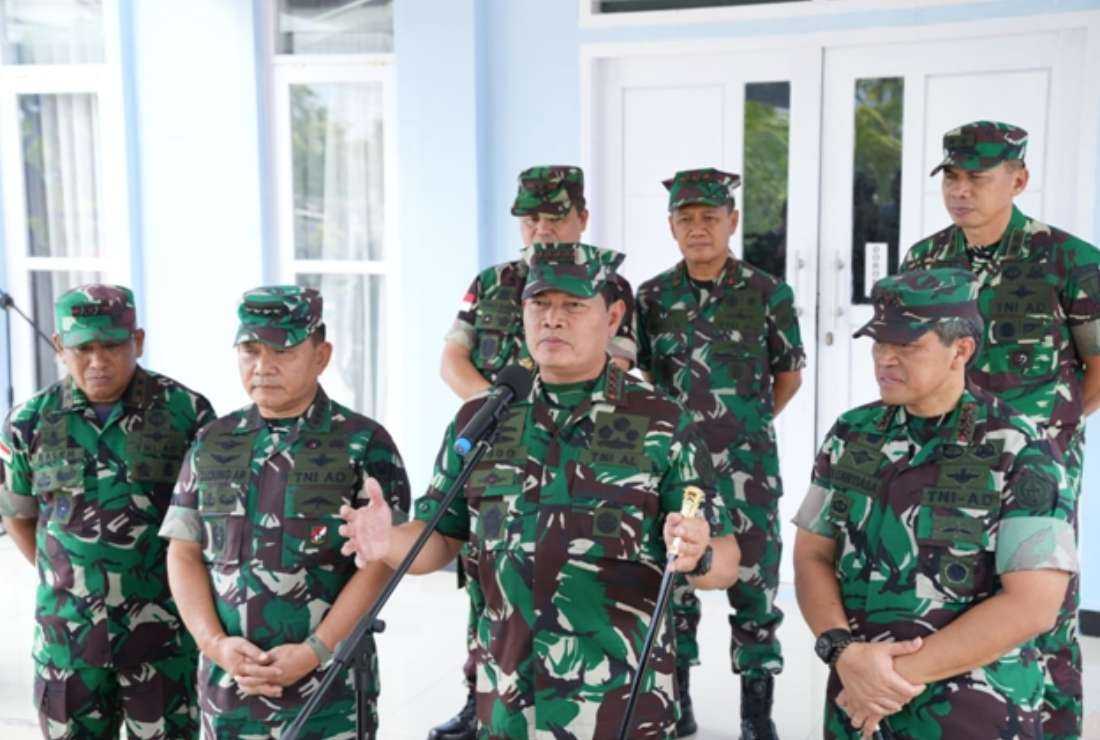
Army announced a special operation after separatists ambushed soldiers searching for a kidnapped New Zealand pilot

The Commander-in-Chief of the Indonesian National Army, Admiral Yudo Margono (middle) declared the start of the combat alert operation in Papua on April 18. (Photo: Indonesian National Army)
Papuans are growing increasingly anxious about their security after the Indonesian military warned of a special operation following the killing of four soldiers involved in a mission to rescue a foreign pilot abducted by rebels.
Military operations are nothing new for Papua but a statement about "the start of a combat alert operation” from the military is something new for Papuans, said Yones Douw, a local human rights activist and chairman of the Justice and Peace Department at Kingmi Church
"The term adds to the panic, triggering psychological stress for the Papuan people who have been experiencing the bad effects of the militarization approach," he told UCA News on April 20.
Admiral Yudo Margono, the commander-in-chief of the Indonesian National Army, announced the combat alert operation on April 18 in response to the deaths of four soldiers during efforts to free New Zealand pilot Phillip Mehrtens who has been held hostage by rebels since February.
The body of a soldier was located last weekend, while three other bodies were recovered on April 19.
The National Liberation Army – Free Papua Operation (TPM-OPM), which the Indonesian government labels as an armed criminal group, has claimed responsibility for the killings of soldiers.
Margono said combat alert operation will be implemented in certain areas considered vulnerable to the threat of rebel attacks, but there will be no increase in the number of troops.
Douw, who is based in Nabire and has been involved in helping internally displaced people in areas of the easternmost region, said the new operation “would not solve the problem, but instead make it worse."
"I believe that what will happen is continuous war because the TPN-OPM also uses weapons," he said.
Douw said the military approach cannot be used forever because it has proven to be a failure so far.
"I don't know why the path of dialogue or negotiations that has been proposed for a long time has never been considered as the path forward," he said.
Natalius Pigai, a Catholic activist and former commissioner of the National Human Rights Commission, also expressed concern that the new operation could justify the killing of civilians, as has been the case so far in Papua with the military approach.
“The term 'combat alert' means troops will always have their weapons and will not hesitate to fire them. Therefore, I still and always ask for peaceful dialogue to stop this humanitarian crisis,” he told UCA News.
Usman Hamid, executive director of Amnesty International Indonesia said in a statement that there is potential for human rights violations with even greater loss of life.
"We are reminded that the condition of human rights in Papua is very worrying. We have recorded that in the last five years, at least 179 people have died in dozens of cases of extrajudicial killings involving security forces and Papuan pro-independence groups," he said.
Christina Aryani, a Catholic and member of the national parliament said she hoped the military would "not take excessive steps" in carrying out this operation.
She warned that the term combat alert operation "has a fear effect in society” even though this policy is said to be enforced “only in vulnerable areas."
A former Dutch colony, Papua declared itself independent in 1961, but neighboring Indonesia took control two years later, promising an independence referendum. The subsequent vote in favor of staying part of Indonesia was widely considered a sham.
Since then, Indonesia has continued to maintain a military presence to fight rebels.
According to data from the advocacy group Imparsial, the number of soldiers in Papua is 16,900, most of whom are units with combat qualifications.
Help us keep UCA News independent
The Church in Asia needs objective and independent journalism to speak the truth about the Church and the state.
With a network of professionally qualified journalists and editors across Asia, UCA News is just about meeting that need. But professionalism does not come cheap. We depend on you, our readers, to help maintain our independence and seek that truth.
A small donation of US$2 a month would make a big difference in our quest to achieve our goal.

Share your comments